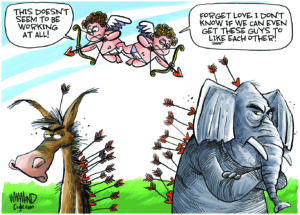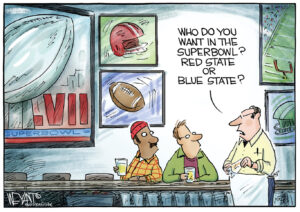Marie Cocco: Even in Defeat, Bush Is Myopic
Bush still doesn't seem to realize that millions of Americans voted to signal their displeasure with the GOP for abandoning the poor and middle class.WASHINGTON — Understand that the Democrats are saying what they mean — and they mean what they say.
The talking heads have talked themselves into believing that the resounding Democratic congressional victories on Tuesday night were a referendum on President Bush and the Iraq war, a primal scream from voters in despair over the futile carnage half a world away.
It was that, for sure. But only the most insulated of insiders could perceive that it was only that.
Yes, it was Iraq and Republican corruption and the unnerving sense, from corner to corner across America, that Bush’s policies haven’t made us safe from terrorism. But when people were asked as they left the voting booths about the issues that were “extremely important” in determining their choices, a concern that roils middle-class neighborhoods emerged: the economy, stupid.
Just about as many voters cited the economy as a pivotal concern (39 percent, according to network exit polls) as corruption (42 percent) and the war on terror (40 percent).
The irony of this election is that the perilous issue of Iraq seems to have a ready avenue for political solution — at home, if not in the bloody precincts abroad. Bush at last announced the overdue departure of Defense Secretary Donald Rumsfeld. And the ultimate exit strategy may come in the recommendations of the bipartisan committee of elders led by former Secretary of State James Baker III and former 9/11 commission co-chairman Lee Hamilton.
Bush repeatedly indicated at his news conference Wednesday that he is looking to the Baker panel to provide him with relief on Iraq. Rahm Emanuel, chief of the Democratic Congressional Campaign Committee and a hard-nosed architect of the party’s stunning House victories, sees the commission as providing at least the beginning of a way out. “Democrats stand ready and eager for the Baker-Hamilton report, so we can get working on a strategy,” Emanuel told journalists during an election eve conference call on Monday. Senate Democratic leader Harry Reid called on the White House to convene a bipartisan summit on Iraq; soon-to-be House Speaker Nancy Pelosi concurs.
The clarity of the voters’ message seems to have provided a light out of the darkness in Iraq.
But since Bush took office six years ago, yawning divides have opened up between the haves, the have-nots, and those who have just enough to get by. The latter two are the Americans to whom Democrats appealed on Tuesday. They now expect the Congress they elected to make good on its campaign promises to raise the minimum wage, fix the Medicare prescription drug benefit by government-industry negotiations to lower prices, provide college tuition help and enhance retirement security.
Not a single senior Democrat who took the microphone at the party’s jubilant parties Tuesday night failed to mention this agenda. “We’re going to make them recognize once again that in America, there’s a middle class,” Reid shouted at one point. A host of Democratic candidates — too many to count — also campaigned on a pledge to somehow ameliorate the national shame of 47 million without health insurance.
The president is befuddled. “The economy’s strong,” he protested at his news conference, ”… and yet, obviously there was a different feel out there for the electorate.” He attributed the negative outlook to “the toughness of the war” in Iraq. He didn’t pause to consider whether times are tough for millions at home.
And he refused — pointedly — to take the partial privatization of Social Security off the table. It was, of course, Bush’s endeavor to change the social insurance system from one of dependable government benefits to one dependent on the whims of Wall Street that unified Democrats thoroughly. It marked the beginning of their political comeback. “Preserving Social Security is something we’ll do every day that we are here,” Pelosi said at her own news conference.
The barricades around the president’s policy in Iraq have fallen, torn down by an angry electorate that feels duped and frustrated by the spilling of American blood for a catastrophic mistake. Using the war as a political cudgel has failed Bush miserably, and forced him to consider the counsel of those outside his inner circle.
But the president still cannot see the depth of the other discontents the voters so acutely feel. The Democrats do.
Marie Cocco’s e-mail address is mariecocco(at symbol)washpost.com.
Your support matters…Independent journalism is under threat and overshadowed by heavily funded mainstream media.
You can help level the playing field. Become a member.
Your tax-deductible contribution keeps us digging beneath the headlines to give you thought-provoking, investigative reporting and analysis that unearths what's really happening- without compromise.
Give today to support our courageous, independent journalists.






You need to be a supporter to comment.
There are currently no responses to this article.
Be the first to respond.